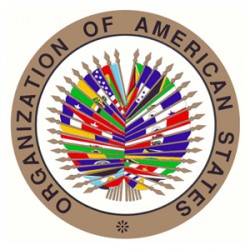International human rights tribunal discusses low asylum grant rates in US immigration court

The Organization of American States heard complaints this month about widely varying rates of granting asylum at different U.S. immigration courts.
The Inter-American Commission on Human Rights, part of OAS, held a hearing Dec. 9 (PDF) entitled “Human Rights Situation of Asylum Seekers in the United States,” focused on the U.S. immigration courts that grant asylum the least often. Participants included the American Immigration Lawyers Association’s Georgia-Alabama chapter, the Catholic Legal Immigration Network, the Innovation Law Lab and several law school immigration law clinics.
Law professor David Baluarte of Washington and Lee University’s Immigrant Rights Clinic opened the testimony.
“Entire immigration court jurisdictions have become so hostile to asylum seekers and their representatives that they are failing to deliver on the international obligation to protect persons fleeing persecution,” he told the tribunal. “We have termed these jurisdictions ‘asylum-free zones,’ where immigration courts have developed a range of sub-regulatory rules with no basis in the law.”
Research shows that immigration courts around the country vary substantially in how often they grant asylum, presenters said. They singled out our immigration courts in Atlanta and Charlotte, North Carolina as particularly unlikely to grant asylum. Records at Syracuse University’s Transactional Records Access Clearinghouse, which follows immigration court data via Freedom of Information Act requests, say judges in Atlanta denied between 70 and 97 percent of asylum requests between fiscal 2011 and 2016; judges in Charlotte denied between 71 and 84 percent. (The Atlanta court’s denial rate is so high that one lawyer told the Washington Post this fall that it influenced her decision to leave immigration law.)
Petitioners also complained that some judges make disparaging statements about asylum seekers in court, leave very little time to prepare the case and follow other practices that may deny asylum seekers due process.
(Immigration courts are federal and managed by the U.S. Department of Justice. Asylum seekers typically must pass an interview with the United States Citizenship and Immigration Services before reaching immigration court.)
The United States government was represented at this hearing by Genevieve Libonati, acting deputy chief of mission to the U.S. Permanent Mission to OAS. She noted that the Government Accountability Office recently released a report on variations in asylum grants. Representatives from the Justice Department’s Executive Office for Immigration Review assured the tribunal that they are taking steps to address some of these issues, including programs funding some representation for vulnerable groups like unaccompanied minors.
An attorney from the State Department’s Office of the Legal Adviser noted that noncitizens are provided due process and certain rights under American law, including the right to a lawyer at their own expense, to present evidence and to appeal to the Board of Immigration Appeals and the federal appeals courts.
Baluarte said the petitioners want the IACHR to visit immigration courts to investigate, report on the disparities and issue a statement expressing concern about courts with very low rates of granting asylum. If the situation is not remedied, he told the tribunal, the petitioners intend to file a case with the IACHR.



